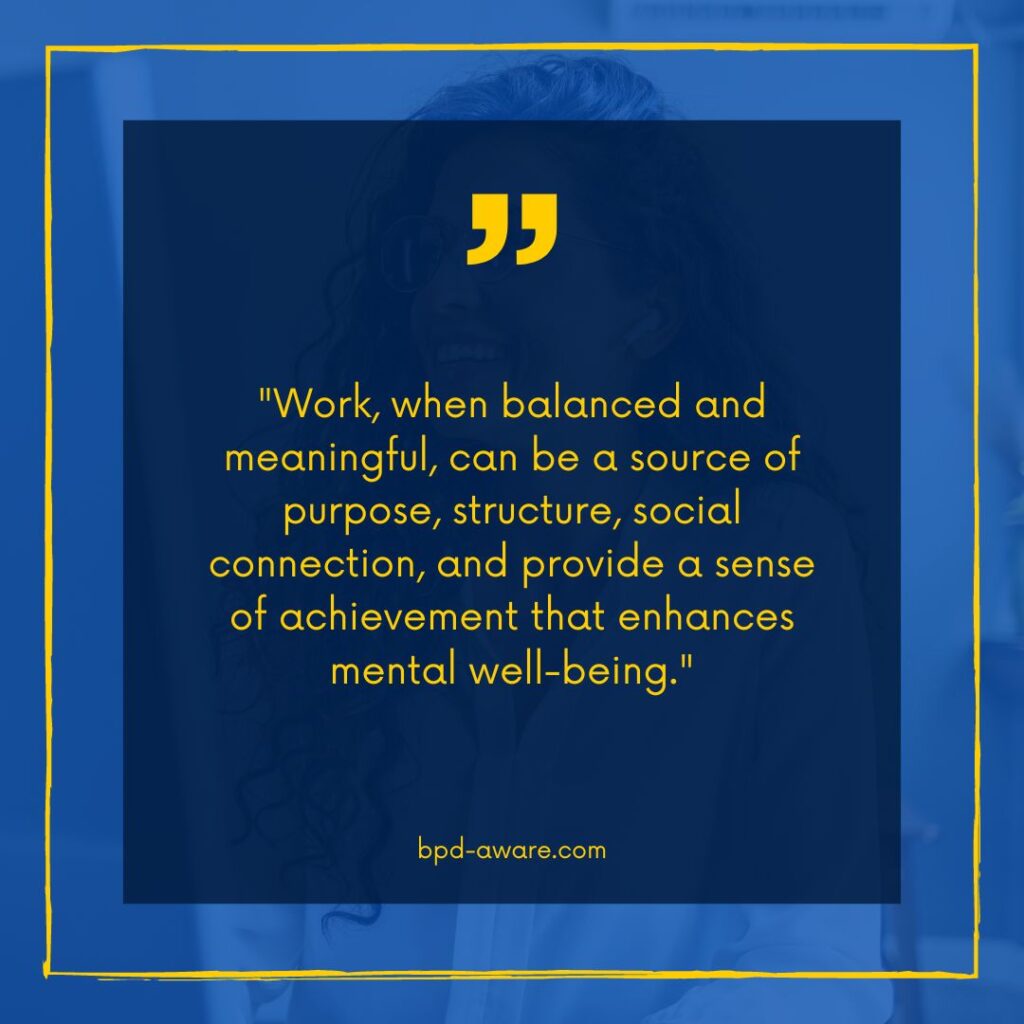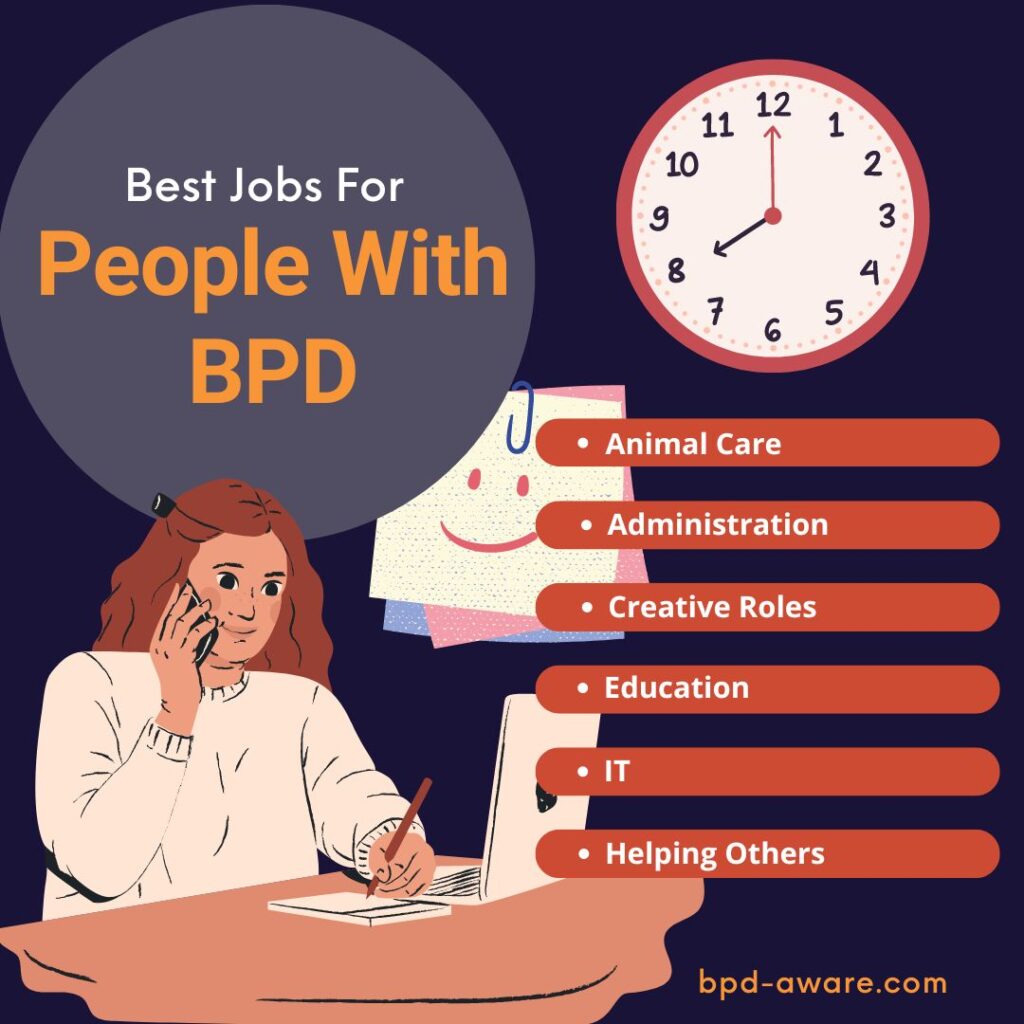Due to the nature of Borderline Personality Disorder (BPD), many people with BPD struggle with employment. The distorted self-identity, mood swings, splits, impulsivity, and executive dysfunction make it massively difficult to hold down any job, let alone plan out a career. A successful career is a big ask of anyone, let alone someone living with the many challenges that BPD provides.
According to a study by the National Library of Medicine, nearly half of all people with BPD were unemployed and only a small percentage were financially self-sufficient. This is a startling statistic that shows just how difficult it is to hold down a job while suffering from BPD.
But that doesn’t mean that people with BPD have to resign themselves to being unemployed. There are many jobs that can be very suitable for people with BPD.
Factors to consider when thinking about what career would fit you:
Level of Human Interaction: For many people with BPD, human interaction is one of the biggest triggers for their symptoms. Keeping interaction to a minimum can be helpful for those who struggle with interpersonal relationships in the workplace.
Supportive Environment: Some workplaces are much more understanding and supportive than others. This can vary greatly even within the same industries.
Manageable Stress Levels: Jobs with high levels of stress and pressure can trigger the worst of BPD symptoms and are usually best avoided.
Structure and Routine: A clear structure and a routine that doesn’t change much can be beneficial for those with BPD. Likewise, making your own routine can be helpful, although it can have drawbacks if you have difficulty with self-motivation.
Flexibility: Jobs that provide flexibility as to when you work can allow people with BPD to make mental health appointments more easily. Similarly, part-time or freelance work can reduce the stress and grind of work; however, these jobs do come with obvious financial drawbacks.
Helping Others: Jobs that involve helping others can help improve interpersonal skills and build empathy. However, this does mean more human interaction than some may be comfortable with.
Creative Outlets: People with BPD often benefit from having some kind of creative outlet in their lives. If this can be achieved at work, then all the better.
This can be quite a lot to think about and it certainly requires some self-reflection and careful consideration. You need to be honest about yourself, your needs, your triggers, and how much you believe your BPD will hold you back in the workplace. Something else to consider is your recovery. One career may pay better than the other but if it makes you miserable, it’ll be all the more difficult to recover from BPD, which is ultimately the most important thing.
Remember, your job today isn’t likely to be the same as the one you’ll be holding in ten years. You could be in a completely different place by then, both physically and mentally.
It’s also important to note that your job doesn’t define you as a human being. You might not necessarily achieve the goals you once had, but that doesn’t make you a failure or any less of a person. It makes you someone who stood up to the challenge of living with BPD and pushed your way through the obstacles on the way.

Here are some of the best jobs for people with BPD:
Animal Care: Working with animals can be hugely rewarding and beneficial for people with BPD. Animals tend to be very loving and non-judgmental so working with them can be therapeutic in a manner most jobs can’t equal. Depending on the exact path you take through animal care, you can keep human interaction to a minimum while helping others and have quite a high degree of flexibility about the hours you work.
Possible jobs with animal care include: Veterinarian or vet’s assistant, pet groomer, pet sitter, dog walker, animal shelter worker, animal trainer, animal control officer, zookeeper, and wildlife rehabilitation.
Administrative Roles: Administrative roles support the efficient operation of an office. These jobs are highly structured and may involve quite a large amount of human interaction, however, some admin roles can be rather solitary. The exact nature of the work done in administrative roles can vary but typically involves predictable patterns and routines, which can be beneficial for some people with BPD.
Possible jobs within administration include: Administrative assistant, office manager, receptionist, secretary, data entry clerk, clerical worker, billing clerk, and human resources assistant.
Creative Roles: Working within the creative field can be beneficial for people with BPD as it gives them a creative outlet. The creative field is also typically more understanding of mental health issues. On the negative side, the work can require a great deal of self-motivation and the pay isn’t always the best.
Possible creative jobs include: Graphic designer, illustrator, photographer, writer, fashion designer, jewelry maker, video editor, musician, acting, dancer, and artist.
Education and Tutoring: If you have a high level of education or a specialist skill that other people would want to learn, working in education can be an excellent career choice. Depending on the exact role, you may work in a highly structured environment or you could work in more of a freelance model as a tutor. Working in education has the benefits of having clear, defined roles within interpersonal relationships. It can also be incredibly rewarding to see someone flourish under your tutelage. On the negative side, the pay is often not commensurate to the hours put in, and working with young people can be emotionally challenging for a variety of reasons.
Possible jobs in education include: Teacher, teaching assistant, tutor, librarian, academic advisor, and online instructor.
IT and Other Technology Jobs: Working in IT can be hugely rewarding financially if you have the skills and mindset for it. For someone with BPD, working with technology can provide structure and routine. Jobs in this field may also have less human interaction than other jobs, but this isn’t always the case. The work can be high-stress though and the hours can become long when certain targets need to be hit.
Possible jobs in IT include: Web developer, software developer, engineer, cybersecurity analyst, project manager, network administrator, help desk technician, quality assurance tester, programmer, and database administrator.
Helping Professions: Helping professions can provide a sense of purpose and fulfillment which can help boost the self-esteem of people with BPD. Helping professions also tend to foster a healing environment, which can be beneficial to people with BPD for obvious reasons. On the flip side, these jobs can be emotionally draining when things don’t go well. You may also come across incidents that trigger traumatic memories. There can also be difficulties with maintaining appropriate boundaries.
Possible jobs in helping professions include: Social worker, counselor/therapist, psychologist, nurse, carer, hospice worker, life coach, mental health worker, and rehabilitation counselor.
Now that we know some of the best jobs for people with BPD to work in, are there any fields they should avoid? I would never want to limit people but I would say that most people with BPD are probably better off avoiding customer-facing roles if possible. These jobs are often highly stressful and some customers can become abusive for little reason, which can trigger people with BPD. On top of that, the pay is rarely worth the stress and abuse.

Final Thoughts
While some people with BPD struggle with employment, there are many avenues that offer the opportunity for success and fulfillment. Jobs in animal care, administration, creative roles, education, technology, and helping professions can all fit well into the life of someone with BPD.
The key is for the individual to consider where they are with their symptoms and what role would suit them best.
Of course, it’s not as simple as selecting a job and walking into it. Many jobs require at least some degree of prior training or relevant qualifications. This also needs to be considered when looking for work. You might need to take another job while you work on becoming qualified for the job you really want.
The workplace can be fraught with potential hazards for people with BPD. Hopefully, with improved education on matters of mental health, businesses can better provide positive environments for people with BPD and other mental health conditions.
Sources, Resources, and Further Reading
- What is a Good Job for someone with Borderline Personality Disorder?: https://www.mentalcurve.com/post/what-is-a-good-job-for-someone-with-a-borderline-personality-disorder
- Jobs for people with BPD: https://www.mentalhealth.com/library/jobs-for-people-with-bpd
- What jobs do you think people with BPD would be perfect for?: https://www.reddit.com/r/BPD/comments/16q8yb9/what_jobs_do_you_think_people_with_bpd_would_be/
- Careers for People With Borderline Personality Disorder: https://www.verywellmind.com/bpd-and-career-choices-425401
















